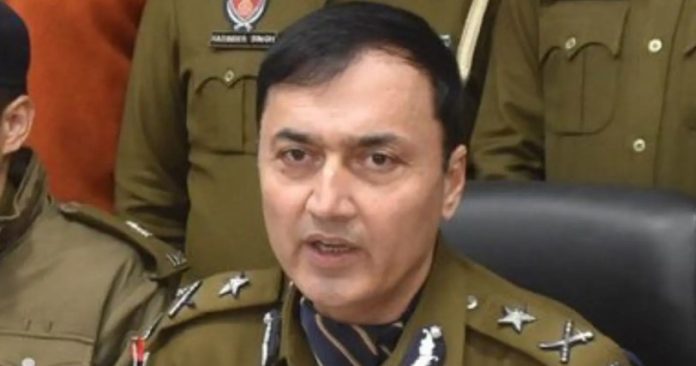In a significant move underscoring the Punjab government’s commitment to transparency and accountability, the state administration has taken stern action against top-ranking officials allegedly involved in irregularities tied to the issuance of driving licenses. The state Vigilance Bureau’s chief, along with two senior officers, has been suspended following an explosive investigation into a scam that has rocked the transport department. This development has not only drawn widespread public attention but also sparked debate on the efficacy of anti-corruption mechanisms in state governance.
The suspension of the Vigilance Bureau’s chief—whose office was meant to uphold integrity within the ranks of bureaucracy—has shocked political observers and the general public alike. For many, this development represents a critical moment in Punjab’s efforts to root out entrenched corruption within state institutions. The allegations suggest that a well-organized nexus had been operating within the transport and licensing system, which enabled the illegal granting of driving licenses, often bypassing standard verification and testing processes.
According to sources within the government, the scam had been running covertly for several months, possibly years, before whistleblowers and internal audits flagged inconsistencies in the data. It was found that numerous individuals were issued valid driver’s licenses without undergoing proper driving tests or fulfilling required documentation. In many cases, licenses were granted to applicants who were either ineligible due to age, physical condition, or lack of legal documentation. Shockingly, reports indicate that some of the licenses were issued in the names of fictitious individuals.
Investigations led by independent oversight bodies and supported by digital tracking and audit trails eventually pointed toward the involvement of senior officials in facilitating and covering up these irregularities. What makes this case even more concerning is the implication of the very officials who were entrusted with upholding legal and ethical conduct across government operations. The Vigilance Bureau chief, along with two subordinate officers, allegedly turned a blind eye to these activities—or worse, actively participated in enabling the illegal transactions in exchange for bribes.
Eyewitness accounts and internal departmental testimonies, now part of an official probe, claim that license brokers and intermediaries were frequently seen inside government offices. These individuals acted as middlemen, collecting hefty amounts from applicants and ensuring licenses were issued without scrutiny. Investigative authorities are now working to determine the extent of monetary gains made through the scam and whether the profits were laundered or stored in unaccounted bank accounts and properties.

The scandal has naturally triggered political repercussions. Opposition parties have seized the moment to criticize the ruling government for not acting sooner and failing to curb systemic corruption. While the government has claimed credit for taking prompt action once the scam surfaced, critics argue that such high-level corruption could only have flourished under a lax administrative framework.
Chief Minister Bhagwant Mann has responded with swift and assertive statements, reassuring the public that no individual, regardless of their rank or designation, will be spared if found guilty. He emphasized that the government was committed to ensuring that the probe is free from bias and political influence, and that the findings will be made public once the inquiry concludes. According to him, such actions reflect the government’s firm stance against corruption and its resolve to cleanse public institutions of malpractice.
The Transport Department, which had come under immense scrutiny, has also been directed to undertake a thorough internal audit of all licenses issued in the past two years. Officials have been instructed to cross-check documentation, driving test records, and procedural compliance. There is also a growing call for digitization of driving tests and real-time monitoring of Regional Transport Offices (RTOs) to eliminate human interference and reduce the possibility of manipulation.
Meanwhile, the suspended officers are expected to face departmental inquiries as well as criminal charges under the Prevention of Corruption Act. Legal experts have opined that if proven guilty, the accused may face not only dismissal from service but also imprisonment and the forfeiture of assets acquired through illicit means. The legal proceedings are expected to be closely followed, as they may set a precedent for how future cases involving high-ranking officials are handled in Punjab and beyond.
On the societal front, the scandal has cast a shadow on the authenticity of driving licenses issued by the state. Concerns have emerged about the potential safety risks posed by individuals who may be holding licenses without proper training or evaluation. In response, traffic authorities have initiated random road checks and verifications, particularly in areas known to be hotspots for such irregularities. There are also plans to introduce stricter testing protocols, including automated test tracks, to restore faith in the licensing process.
This episode has also brought to light the need for strengthening internal vigilance mechanisms. The irony of the Vigilance Bureau’s own chief being accused in such a case has led to a loss of public confidence in watchdog institutions. Many civil society groups and anti-corruption advocates are now calling for independent, citizen-led oversight committees that can help monitor the functioning of critical government offices. Some have also proposed the use of AI and blockchain-based systems to reduce human discretion in high-risk administrative procedures.
As the investigation unfolds, the focus remains on identifying all players involved in the scam, understanding the scale of the operation, and recovering any financial losses sustained by the state. There is also a broader dialogue taking place around the kind of systemic reforms required to ensure such incidents do not recur. Whether through stricter laws, increased transparency, or better use of technology, it is clear that Punjab has reached a turning point in its battle against corruption.
Ultimately, the suspension of these high-ranking officials serves as both a cautionary tale and a possible catalyst for change. It demonstrates the risks of unchecked power and highlights the urgent need for institutional reform. More importantly, it reinforces the belief that accountability—no matter how delayed—is essential for a functioning democracy. As the state grapples with the aftermath, the coming weeks will determine whether this moment of reckoning leads to genuine transformation or merely becomes another chapter in the long list of bureaucratic scandals.


